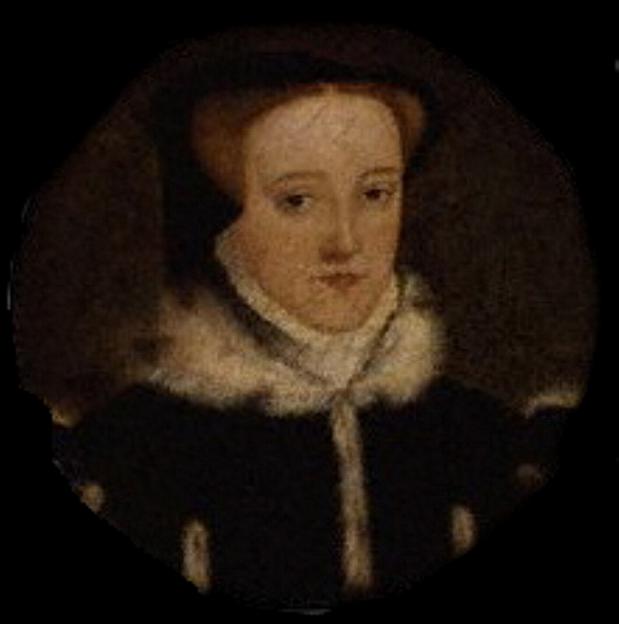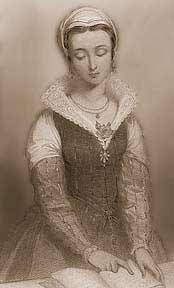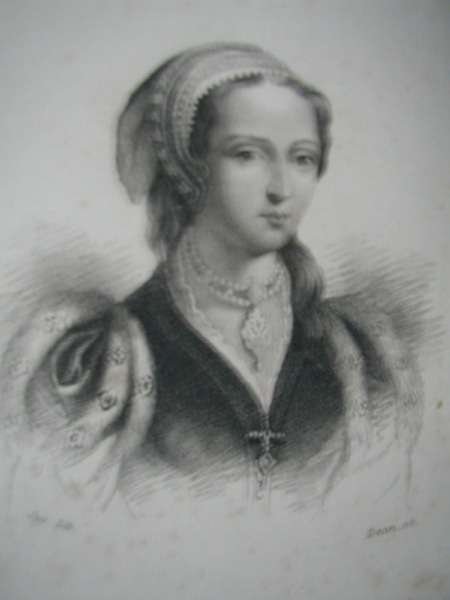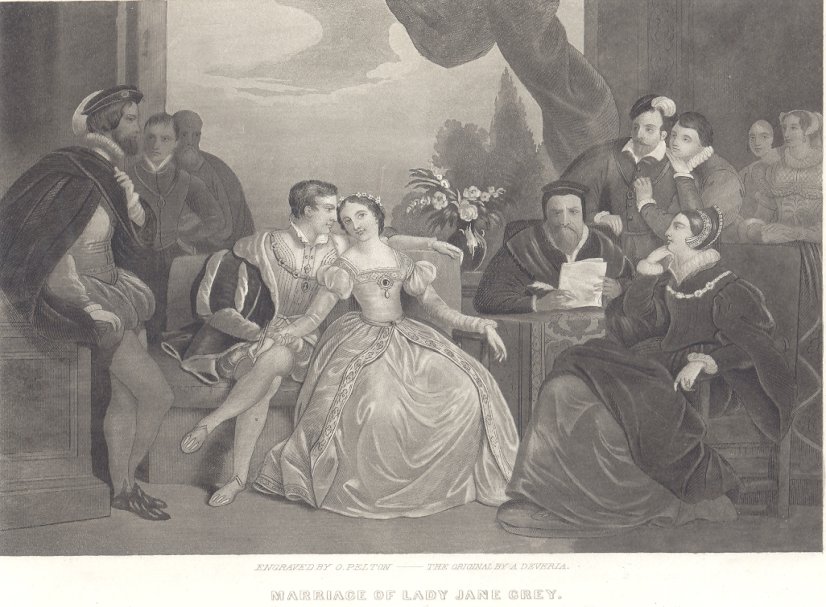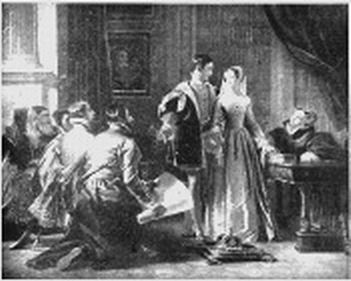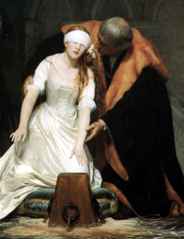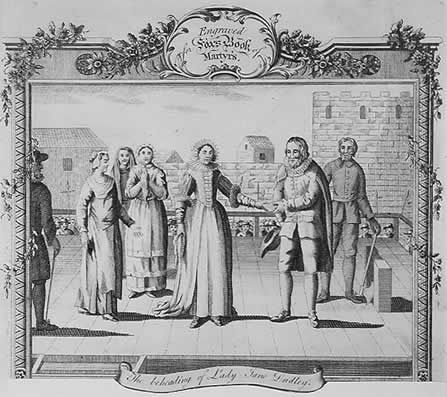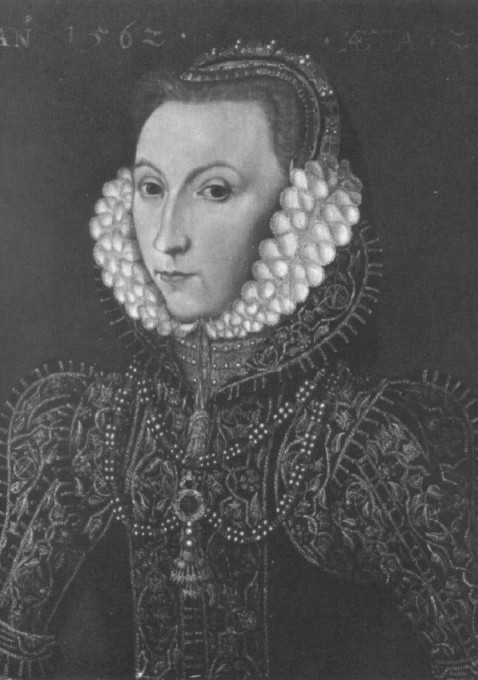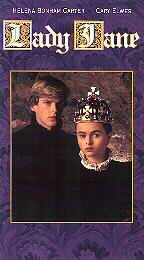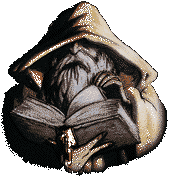Would you like to make this site your homepage? It's fast and easy...
Yes, Please make this my home page!
|
the ancestry of Lady Jane Grey-Dudley......
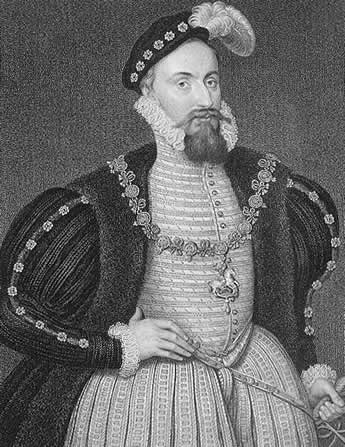
|
her father Henry Grey......
Lady Jane Grey was the eldest child of Lord Henry and Lady Frances Grey, the duke and duchess of Suffolk. She was a viable heir to the English throne because of her maternal grandmother, Princess Mary Tudor. After the death of her first husband, King Louis XII of France in 1515, Mary secretly wed her true love, Charles Brandon. Brandon was her brother Henry VIII's best friend; the king's friendship and Brandon's service to the Crown led to his creation as duke of Suffolk in 1514. He and Mary had a son, Henry, who died as teenager. Their next eldest child was a daughter, Frances. Under the terms of the Third Act of Succession (1544) and Henry VIII's last will and testament (1547), the Suffolk line would inherit the throne after Henry VIII's children died childless. In other words, the throne would pass to Henry's son Edward; if Edward died childless, it passed to Henry's eldest daughter Mary; if she died childless, it passed to Henry's youngest daughter Elizabeth. If Elizabeth died childless, the throne passed to Lady Frances. This plan completely disregarded the children of Henry's elder sister Margaret, the former queen of Scots. Henry did not care for Margaret and, more importantly, did not want the English throne in Scottish hands.
So it was through Princess Mary that Jane Grey was bequeathed her deadly heritage. Still, no one in the 1540s expected the Suffolk line to rule. After all, Henry VIII had left three heirs and it was unlikely all three would die childless. Of course, we know that this did occur and the Tudor dynasty died with Elizabeth I in 1603. It was only in 1552, with Edward VI's health rapidly failing, that people realized there would be a succession crisis. According to parliament and Henry VIII's will, Mary was Edward's heir - but she was Catholic, in her late thirties, and never robust. More importantly, Edward was a devout Protestant and did not want Roman Catholicism restored in England. Urged on by self-interested advisors, he removed Mary from the succession on the grounds of her illegitimacy (she was declared so by parliament in 1532.) But if he removed Mary, he also had to remove Elizabeth even though she was a Protestant; Elizabeth had also been declared a bastard by parliament in 1536. In his Device for the Succession, written in his own hand, Edward wrote that they were both "illegitimate and not lawfully begotten."
Edward's course of action removed the succession from the heirs of Henry VIII and gave it to the heirs of Henry's younger sister, Mary. This was a tumultuous course for many reasons. For example, the king of France, Henry II, was raising Mary Stuart, Margaret Tudor's granddaughter; he planned to marry this ten-year-old queen of Scots to his son and heir, Francois. By all the accepted laws of primogeniture, she had a better claim to the English throne than her Suffolk cousins. In fact, most European Catholics believed Mary's claim better than her Tudor cousins, Mary and Elizabeth, since both were illegitimate by acts of constitutional and canon law. However, Mary of Scotland was in France - not England; also, the Suffolks were Protestant and she was not. Edward VI never considered leaving her the throne.
The above paragraph illustrates the complexity of blood ties within the Tudor family. And since Mary Tudor was half-Spanish and thus cousin to the Holy Roman Emperor, the succession crisis interested most of the major powers of Europe - France, the Hapsburg Empire, Ittaly (the pope hoped to bring England back to his authority), and the Protestant princes of Germany. When Edward VI died in 1553, all of these nations waited to see who would triumph. Mary.... Elizabeth.... Mary of Scotland.... Jane Grey.... Which would become queen?
Also, Europe waited to see how England would welcome a queen as their sole ruler. All of the possible candidates for the throne were women, an unprecedented occurrence. The only woman to attempt to rule England as her father's sole heir had been Matilda in the 12th century; she had been forced out of the country by popular revolt and a male cousin named Stephen of Blois became king. Now it seemed the English had no choice but to accept a woman ruler.
And because of the secret marriage of Mary Tudor and Charles Brandon, the first woman to rule England in her own right would be Jane Grey.
a mini-biography of Lady Jane Grey-Dudley.... the nine day queen!
Below is a mini-biography of Lady Jane Grey-Dudley written by me, and it is my interpetations of the various facts and information I have been able to gather about her, and to the best of my knowledge is as true a biography of Lady Jane's life as any other stories or biographies written about her life. If there is any information on this web site that you believe may not be true, please let me know so I can verify and correct the information in question. Also, if you have any information about Lady Jane and would like to share it with us, send me an e-mail with this information, so I may place it on this web site. My e-mail link is at the bottom of each page.
Thanks, Dudley
After Edward VI's death, the Tudor succession was once more an urgent question and anyone with royal blood was a target - for various plots of dissatisfied citizens, for international speculation, for aristocratic nobility.
|
|
Young, beautiful and learned Jane, intent
On knowledge, fount it peace; her vast acquirement
Of goodness was her fall; she was content
With dulcet pleasures, such as calm retirement
Yields to the wise alone; -- her only vice
Was virtue: in obedience to her sire
And lord she died, with them a sacrifice
To their ambition: her own mild desire
Was rather to be happy than be great
For though at their request, she claimed the crown
That they through her might rise to rule the state
Yet the bright diadem and gorgeous throne
She viewed as cares, dimming the dignity
Of her unsullied mind and pur benignity
by William Hone (1780 -1842)
Inscribed beneath a portrait of Lady Jane Grey
a lady of great promise......
Life began for Lady Jane, in Leicestershire, England, in the year of our Lord 1537, of the month October, at Bradgate Manor, a hunting lodge belonging to her parents, Henry Grey , the Marquis of Dorset, and Frances Brandon, daughter of Henry the VIII's sister, Mary. Even at the very beginning of Lady Jane's short life, she fell victim to the abuse and neglect of her parents, just as it would be throughout the whole of her life, and finally the cause of her tragic death. Lady Jane's birth, what should of been a joyful and an exciting event, for her parents and for the Grey family as a whole, was being completely ignored by both Jane's mother and her father. To them, a more important event had taken place two days after Jane's birth, that was the birth of Edward the VI, the royal male heir to the throne of Henry the VIII. At Bradgate Henry Grey, Marquis of Dorset, not wanting to miss out on all of the festivities to celebrate Edwards birth, left his newly born daughter Jane, for Court to pay his respects and take part in the festivities.
In Jane's own words, her parents "were sharp and severe". Lady Jane once told a visitor to her family home, Bradgate Manor, "that her mother and father expected for her to do everything, as perfectly as God made the world, or else I am sharply taunted, so cruelly threatened.... I think myself in Hell." Jane told of her parents pinching her and abused her in other ways, she would not mentioned out of respect for them .
Lady Jane, up to a point over came the abusiveness given her by her parents, and their constant interference over her future, and became a fine and upstanding young lady, but at the end, it finally cost her, her life.
|
|
to escape the abusiveness by her parents......
She found refuge in her studies, which she enjoyed so much that she cried when her lessons were over for the day. "Whatsoever I do else, but learning, is full of grief, trouble, fear, and whole disliking," she said. But, she managed to keep her mind on her education and studies. Beginning school at the very young age of three, by the time she was fifthteen, she was considered the equivalent of a young woman of twenty, in maturity, religious zeal and in social awareness.
Jane also had a spirited and courageous side to her nature, as well, which she showed one day, when she and a companion, Francis Beaumont, were confronted by a vicious wolf while walking home to Bradgate House. By the 1540s, wolves were thought to be extinct in Leicestershire, so this wolf, at the very least startled the two young girls but, didn't freighted them enough to loose their ability to protect themselves. The wolf had already attacked a young child, and Jane and Francis, armed only with a small hunting knife and a stick, had to struggle hard to kill the wolf. This event truly showed how quick thinking and courageous she was, even at this early age.
Lady Jane was not only brave and courageous, but was an intelligent woman,, as well. She took well advantage of being provided excellent tutors, she spoke and wrote Greek and Latin at an early age; she was also proficient in French, Hebrew, and Italian.. When Lady Jane was barely nine years old she went to live in the household of Queen Catherine Parr, the sixth wife of Henry the VIII. Where she learned the ways of the socially elite. Jane adored Catherine and found love and tenderness with her that had been lacking in Jane's parents and enjoyed staying with Catherine.
Upon Catherine's death in September 1548, Lady Jane Grey, now 11 years of age, was the chief mourner at Catherine's funeral, for she thought of Catherine, more of a mother, then her own mother.
Later, she was made a ward of Catherine's husband, Thomas Seymour. This was accomplished by Henry Grey, already trying to plan Lady Janes future for her, paid 2000 pounds to Thomas Seymour, on a promise by Seymour, that he would arrange for Jane to be married to Edward, the future King.
|
|
her parents used her as a pawn......
Always trying to increase their social standings, they continued to neglect taking into consideration as to what Lady Jane may of wanted to do with her life, or whom she may of wanted to marry. They used Lady Jane as a pawn, to fulfill their big dreams of advancing themselves in the social realm of the Court with the marriage of their daughter to a nobleman or someone else of high standing in the social world. So, with this arrangement with Seymour, for the marriage between Edward VI, the future king, and their daughter, they felt their future to be secured.
It was always what was better for the social well being of the parents, that ruled any decisions as to how Jane would live her life, and who she would eventually marry. Seymour had promised that with his connections at court, he would be in an excellent position to suggest Jane as a suitable wife for the King. In a letter to Henry Grey, he expressed his hopes for Jane's future, "If I may once get the King at liberty, I dare warrant you that His Majesty shall marry no other but Jane." Seymour had a high regard for Lady Jane and could see the potential of her being selected as a favorite choice for the wife of Edward. She was, a lady of great promise, with her high intellectual and social skills, her deeply Protestant religious fervor and convictions, plus her proficiency of several foreign languages, would make her an idea wife, for any young ambitious nobleman. of the time, and would of course with all of these qualities, would indeed made Lady Jane a good Queen.. Seymour, and the Grey's had great hope of the marriage of Edward and Lady Jane, and had certainly made their plans for this to come about, plus there were many more people that expected Edward to marry Lady Jane.
Seymour's and the Grey's plans were not to be, for in 1549 Seymour was arrested while breaking into the King's apartments in an attempt to have an audience with the King. The Grey's quickly distanced themselves from Seymour once word of this scandal broke, and Seymour was soon executed for treason.
After the execution, Jane returned to her home in Bradgate and it was soon arranged, for her wardship to be passed on to John Dudley, the Duke of Northumberland. This event at the time was of little significance in the life of Lady Jane, but later this change of her wardship to John Dudley would deeply change the remainder of her short life.
By the time Jane was fifteen, her parents had abandoned their dream of marrying Lady Jane to King Edward. For the King was very ill by this time, and it was fairly well known that he wouldn't live into his adulthood. Already the great nobles of the land were scheming for their own advancement in the event of Edward's death., including our own, John Dudley, Duke of Northumberland. Potential successors to the throne included Henry VIII's two daughters, the Catholic Mary and the Protestant Elizabeth, his niece, Lady Jane's mother Frances Brandon, Duchess of Suffolk, and his great-niece Lady Jane Grey. Jane's mother, Frances Brandon, later gave her daughter, Lady Jane, her position of order in the line of successors to the throne, knowing , of course Lady Jane would probably have a better chance to ascend to the throne then she. This made Lady Jane, at the young age of fifthteen, third in line for the throne of England, and sealed her fate.
|
|
the marriage......
In 1551, John Dudley was made the Duke of Northumberland and the chief councilor to King Edward VI. This made Dudley the most powerful man in England, short of the King, In reality, with John taking the place of Edward Seymour, John was, the true power behind the throne. For Edward and John were close friends, and Edward trusted John, and in most cases, went by John's judgments.
In April 1552, Edward became sick with the measles and soon he was stricken with tuberculosis as well. By the following spring Edward was so ill that he was weak and spitting up blood. It was obvious Edward was suffering a great deal. John Dudley, being his closet advisor and friend was hurt and very upset with the King's suffering. This drove John to even ponder the idea of retiring from the politics of the Court, but this was only a passing dream. For John had made too many enemies, mainly with the Catholic noblemen and churchman, who would most surely rally around Mary.
When, It became apparent, that Edward would likely die before he ever had the opportunity to produce an heir. It frightened a lot of Protestant noblemen, including John Dudley, they had prospered in the last six years of Edwards rule and the prospects of the throne being succeeded by a Catholic, would spell doom for most of the Protestant Peers, especially, if the Catholic was Mary. In truth, if Mary sat on the throne the best John could hope for would be political and financial ruin. Without Edward on the throne, John would loose his most high position in Edwards Court, and even more likely his head, for his Protestant beliefs.
John had to come up with someway to keep his position and his head. John didn't have much time either, before the sure death of Edward would come about. He could of tried and arranged a marriage between the protestant Elizabeth and his son Guildford. Which would of been more favorable of a good outcome. Elizabeth had too much political sense about her to be a pawn of John's, and John knew Elizabeth would never be a close ally to him. For Elizabeth distrusted John , she thought him too ambitions of a man, and was concern of his true motives. She was in fact afraid of John and his power and of his easy way of influencing people . The only other choice John had was Lady Jane. He knew that Lady Jane was also in line for the throne, and also that her parents were very ambitious. With John, having Lady Jane's wardship, he felt that he would have easy influence over Lady Jane plus, she was a devout and committed Protestant. He knew Lady Jane didn't want Mary on the throne no more than he did, and be more inclined to accept the throne to keep Mary from becoming queen.
John went about to put his plan into motion. Edward, himself, had already been pondering for months, to come up with some sort of a solution of Mary's succession to the throne. He didn't want his Catholic sister to govern England. His reasons were purely religious, he wanted England to remain protestant, for what he thought, was for the good of the people. Just as Mary thought the Catholic religion was the path to righteousness. Edward also believed, "as King, charge by God, with the responsibility for the religious welfare of his people, that it was his sacred duty, and for the sake of his immortal soul, that Mary be prevented from leading England back to Catholicism, and on the path to damnation". Edward thought, this necessity overcame all else. "What was Henry the VIII's will when compared to the divine retribution, as well as his own will"?
When John suggested to Edward that Lady Jane would be best suited for the throne, Edward agreed and began his plan plan of "Device for Succession". At first he named Frances Brandon as his successor, but with Frances herself turning her rank of succession over to her daughter, Lady Jane, and the fact that Frances herself too old to bear any male heirs to the throne. Edward changed his plans, and he then named Lady Jane and all her males heir's successors to his throne. Edward, also wrote in his will, disclaiming the rights to the throne of Mary and Elizabeth. Both Mary and Elizabeth were excluded on account of their unaltered 'illegitimacy'. This was the true beginning of the end for Lady Jane.
You may ask, why wasn't Elizabeth taken into consideration? Well, the answer would be that Edward and Elizabeth didn't have a close relationship, as Edward did with Lady Jane. Elizabeth and Elizabeth's mother were not considered a part of Edwards Court. Elizabeth was never asked to any of the functions of the Court, nor did she take part in any of its duties, as Lady Jane always was. Edward and Lady Jane were close friends and allies, and consoled with each other if, any of them had a problem. Edward liked Lady Jane very much, and thought of her as a very devout Protestant and a very intelligent woman. And of course, if Edward had not became so ill, Edward and Lady Jane would of probably had married. Edward later, even consoled and council Lady Jane, when she was being forced by her parents with verbal and physical abuse, to accept the choice of husband they had made for her. He told her, that it was her duty as a protestant, and Christian to marry, as her parents wished and also, to become Queen, after his death. Although Edward and Elizabeth didn't have a close relationship, due to the fact Edward thought Elizabeth as a illegitimate sister. Elizabeth and Lady Jane were cousins and close friends, in fact, after Lady Jane was arrested, Elizabeth stayed with Lady Jane up to the end, to comfort Lady Jane, and was present at Lady Jane's execution. It is believed that Elizabeth recognize Jane as Queen, and not a pretender.
After Edward finished writing his succession document, John Dudley took it to the council and gained the agreement of his fellow council members to the King's change in the succession. John then went to the Grey's suggesting that Lady Jane marry his last remaining unmarried son, Lord Guildford Dudley, not letting it be known to the Grey's, his full plans for Lady Jane to become Queen. Both Henry Grey, the now, Duke of Suffolk and his wife Frances, knowing that Edward was dying, and that there wasn't any hope in Lady Jane marrying the King. They both believed, for their daughter to be married to the son of the second most powerful man in England, would be in Lady Jane's best interest, and of course theirs as well. Persuaded by the prospects of power and wealth, they agreed, and went about announcing the up-coming marriage of Lady Jane Grey and Guilford Dudley.
Lady Jane, thinking that she was already promised to Edward, Lord Hertford, despite the fact that no formal arrangements had been made, protested the upcoming marriage, between her and Guildford. Many have argued that Lady Jane protested the marriage because she detested Guilford. This is very unlikely, he was handsome enough, fair headed, and about her age. He was arrogant and spoilt, his mothers favorite, but had no other flaws documented in any accounts of Guildford. If Guildford were compared to other men of his age at the time, he was a good match. Jane's resentment of the marriage was of her reservations centered around her distrust of John Dudley, she also disliked and feared John Dudley as most people did.
Jane did suffer a lot for her protesting of the marriage through verbal abuse from her mother, chastising her for not having any respect for her or for her father wishes, and physical abuse from her father. She finally submitted and agreed to marry Guildford.
The wedding took place on May 25, 1553, at Durham House, the London home of the Dudley's. The event was a triple wedding with not only Jane's marriage, but the marriage of her younger sister Katherine to Edward, Lord Herbert, and finally the marriage of Catherine Dudley, daughter of the Dudley's to Lord Hastings, son of the Earl of Huntingdon. The event was so rushed that the garments for the weddings had to be borrowed from the royal Master of the Wardrobe. Jane wore a gown of gold and silver brocade embroidered with diamonds and pearls.
After they were married I don't believed they had a problem with the marriage. I believe they developed a great deal of respect for each other, and had feelings of some type of love between them. Maybe not the head over heels kind of love, for marrying anyone for love in those days was very rare, but, one of mutual respect, attraction and admiration for one another. For it was documented when they were imprisoned at the Tower, they both showed concerned for the others welfare, Guilford carved Jane's name in the Tower's wall, a sure sign of some sort of affection for Jane, and Jane cried openly when Guilford was executed. I don't believed she would of done this, if she detested Guildford like most writers like to tell the story.
The day of the weddings, John Dudley, the Duke of Northumberland, had managed to ally himself to three of the most powerful families in the Royal Court. But, this later prove to be not enough to keep Jane on the throne and to save John Dudley's life.
|
|
the nine day queen......
By early June, Northumberland disclosed to Lady Jane's parents, of Edward's Will naming Lady Jane as his heir to the throne and to make Lady Jane Queen. At that time she was moved to Durham House to live with her husband. Jane herself was unaware of the King's wishes but, was informed that the King was 'extremely ill' and that she should 'prepare herself' for whatever Edward might plan for her.
King Edward died at Greenwich, on July 6th 1553, at late evening. The event was kept perfectly secret during the next day but, measures were taken to occupy and fortify the Tower of London. On July 8th the lord mayor of London and the Council secretly declared the death of king Edward, and also certified how Edward ordain for the succession of the Crown by his letters and Will, to the which they were sworn, and told to keep it secret."
On July 9th, Lady Jane was taken to Syon house by barge, at this time Lady Jane had no idea what was taking place, nor did she know that, the young King Edward, had die. She had been ill herself and had been recuperating at Chelsea Manor for the past few weeks. That Sunday, her sister-in-law, Lady Mary Sidney, came to collect Jane and bring her to Syon House, her father-in-laws residence on the Thames. She was not allowed to refuse the journey despite her illness.
When she arrived at Syon House and everyone started bowing to her, she was amazed and wondered why everyone was bowing to her. When she was told that young Edward was dead and through Edward's "Devise of Succession", named her Queen, it shocked her so, that she fainted. When she woke, Lady Jane said, "The crown is not my right, and pleaseth me not. The Lady Mary is rightful heir." Of course this anger John and her parents and she was severely verbally reprimanded, by John and her mother. Her mother reminded her of her duty to King Edward, whom named her in his will as Queen, and her duty to her parents. At this she submitted to everyone's wishes and said, " If what hath given me is lawfully mine, may Thy Divine Majesty grant me such sprint and grace that I may govern to Thy glory and service, and to the advantage of the realm." She became Queen before she was sixteen.
On Monday, she was transported by barge on the Thames River to the Tower of London. After arriving at the Tower of London, the new queen was crowned in the White Tower and took up residence in the Royal Chambers at the Tower. The next few days went with Queen Jane tending to routine matters, signing papers and talking to her councilors. But during all this time she was extremely stressed. She didn't want the throne, nor did she want to upset the formidable Mary.
While Mary was traveling to London after being summoned to Edwards bedside, she was told by some people that King Edward was dead, and Lady Jane was crowned queen. This was the first she heard of this, and when Mary found out what had taken place, she was very upset, to say the least. Her and Elizabeth were declared Henry the VIII's "illegitimate bastards." With this, Mary sent a message to Queen Jane, demanding Jane renounce her title or she would take her crown by force.
The fatal mistake came when Queen Jane found out, that the Council had order her father, Henry Grey to go and arrest Mary. She pleaded with her father not to go and stay with her. This was the step that would eventually cost her, her husband, Guilford Dudley and John Dudley their lives. Instead of her father going to arrest Mary, John Dudley went himself. While he was gone things turned for the worst. The Council heard of Mary massing a strong army to overthrow the new Queen, they became frightened by all this, and afraid of themselves loosing their heads if, Mary should win in the coming conflict, started doubting King Edward's "Design of Succession" as being legal, and doubting John Dudley's authority. To save their own lives, they deserted Queen Jane and decided to join Mary. The Council promptly went to Baynard's Castle, where Mary was, and proclaimed John Dudley as a traitor and Mary, the Queen. This in-turn started a chain of events no one could stop. After hearing of the Councils desertion of the new Queen, the army and the navy, that John had acquired fled, deserting John, and with this John had no recourse, but to surrender to Mary.
Queen Jane willingly resigned, but she was not allowed to leave the Tower. After hearing of John's arrest and their daughters resignation, Henry and Frances Grey fled for their lives, leaving their daughter and husband behind. Jane and Guildford were soon taken into custody. Lady Jane was taken to 5 Tower and Lord Guilford to the neighboring Beauchamp Tower. Forbidden to see each other. This was the end of the reign of Queen Jane, "the nine day Queen".
|
|
the execution of Lady Jane......
Despite the fact that Northumberland recanted Protestantism he was beheaded on the 23rd August 1553. Jane remained in the Tower, despite the fact that Mary realized she had simply been a pawn in the whole affair. The two women even dined together at the Tower. Mary gave her the choice - recant Protestantism and live. Jane refused but she still did not expect to die. Another event however sealed her fate - her father was found to be part of the Wyatt Rebellion (a group led by James Wyatt) who were adamantly against Mary choosing Philip of Spain as her husband. Mary began to believe that if she kept Jane alive the threat would always be present.
Lady Jane and her husband were tried and convicted of high treason on November 14, "to be burnt alive or beheaded, as the queen shall please" and both Lady Jane and Guildford were beheaded on February 12, 1554; her father was beheaded a few days later on February 23. Frances Grey kept her head due to her friendship with her cousin Mary. Before her execution, Lady Jane wrote in her prayer book and wrote several letters to her father, and a letter to her sister, Katherine Grey, on Feb. 11 1554.
The letter written to Katherine contain a prayer written by Lady Jane and a short note to Katherine, which read;
"Oh, Merciful God, consider my misery, best known unto thee; and be thou unto me a strong tower of defense, I humbly require thee. Suffer me not to be tempted above my power, but either be thou a deliverer unto me out of this great misery, or else give me grace patiently to bear thy heavy hand and sharp correction."
" I have sent you, good sister Catherine, a book, which although it be not outwardly trimmed with gold, yet inwardly it is more worthy than precious stones. It is the book, dear sister, of the laws of the lord: It is His Testament and Last Will, which He bequeathed unto us wretches, which shall lead you to the path of eternal joy, and if you, with a good mind read it, and with an earnest desire, follow it, it shall bring you to an immortal and everlasting life.
It will teach you to live and learn you to die.... It shall win you more than you should have gained by the possession of your woeful father's lands, for as if God prospered him, you shall inherit his lands.... [it holds] such riches as neither the covetous shall withdraw from you, neither the thief shall steal, neither let the moth corrupt.... And as touching my death, rejoice as I do and consider that I shall be delivered of this corruption and put on incorruption, for as I am assured that I shall for losing of a mortal life, find an immortal felicity. Pray God grant you and send you his grace to live in the love...
Farewell good sister, put only your trust in God, who only must uphold you,
Your loving sister, Jane Duddley "
On the day of their execution, Guildford was executed first on Tower Hill, and Jane wept openly when his body was returned to the Tower. At her execution, Jane herself was not executed publicly, but within the confines of the Tower itself. She went calmly to her death. She said that she was going to die a good Christian. She asked those present to pray for her while she was alive. She strongly believed that she was going to end up in a better world after she died, where she would be treated better than she had been on earth. She was blindfolded by the executioner, yet lost her sense of direction and got confused when going to the block, crying out
"Where is it? What shall I do? WHERE IS IT!" She had to be guided to the block. Her last words were
"Lord, into thy hands I commend my spirit".
'Live still to die, that by death you may purchase eternal life.... As the preacher sayeth, there is a time to be born and a time to die; and the day of death is better than the day of our birth.'
Lady Jane Grey's message to John Brydges, lieutenant of the Tower of London, 1554.
|
|
after the execution......
Her two ladies, Mrs. Ellen and Mrs. Tylney, attended to her body after the execution, however her body lay alone for 4 hours where she had been beheaded while arrangements were made to bury her. She was place in a plain coffin and was buried without ceremony near Boleyn and Howard at St. Peter's-ad-Vincula. When Queen Victoria had the church cleaned in the nineteenth century, a coffin with a small body and a detached head was opened, but the skeleton crumbled and was placed in an urn. A legend also exists where her body was returned to her childhood home of Bradgate and buried, surrounded by new trees that still exist.
|
|
her sister Catherine Grey......
Her sister, Katherine Grey was kept at court by Queen Mary I and Queen Elizabeth I for security purposes. Katherine was married to Edward Seymour, Earl of Hertford, in a secret ceremony and soon after they had their first child. When Katherine and Edward were arrested and placed in the tower, it was ordered that the two be separated, and place in different rooms, yet Katherine became pregnant once more and had two sons in total. Katherine died when she was only 27. Her husband, Edward Seymour lived to be 83.
|
|
the video......
If you would like to see a movie about Lady Jane, which comes close to the events of her life, go to the video store near you and rent the movie Lady Jane, the video cover is pictured above. Just remember it's made by Hollywood. So don't expect this film of being close to the real fact, but it does give you a good idea of what went on and what the period clothes looked like.
in conclusion......
Just as many mistakenly think that the marriage between Lady Jane and Guilford was a treasonable act to change the succession to the throne, it wasn't, it was Edwards will, that Mary not succeed him, and Lady Jane was, in fact a legal heir to the throne. The marriage had nothing to do with Lady Jane, becoming Queen. Married or not, King EdwardVI, wanted the Protestant Lady Jane as his successor, and the next Ruler and Queen of England.
With Edward trying to find some way to keep the Catholic Mary off the throne, John suggested that Edward name Lady Jane as his successor, being she was protestant, and was in line to the throne, and for Lady Jane to marry Guildford, of which Edward whole-heartedly agreed too.
Edward and John Dudley, Duke of Northumberland, were also very good friends, with each truly caring about the welfare of the other, and together they planned the wedding. The King himself sign the order for the wedding party to be able to use the clothes from the royal wardrobe. The ascension of Lady Jane to the throne and to make her Queen, was the King's own wish and his will. If, Edward hadn't became ill, and eventually died, Lady Jane and Edward would have been married.
If John, Lady Jane or Guildford committed any treason, it was only against the Catholic Church itself, and certainly not against England, as many writers of of the past and of today like to think. They were very patriotic and loyal to the Crown and to England. All they were doing, were being loyal to their Late Kings wishes and orders, just as any other loyal subject would have done.
These same writers and historians, like to make a big deal out of Lady Jane not making Guilford, King, saying Lady Jane did this to get back at John Dudley.
Lady Jane was not ignorant to the fact, that she lived in a male dominate world, and for her to give the title King to Guildford, would be causing much confusion and discourse in her court. All of the Councils and her subjects would be constantly looking to King Guildford for orders and not Queen Jane. Although England has had many Queens before Jane, none of them had any power, and their husbands did the ruling, Lady Jane would be the first ruling Queen.
This was one of the same reasons Elizabeth I, never married so, she could keep complete power, and the focus of the court on her being the Queen and supreme ruler of England, and not the husband. Just as Queen Mary, Queen Victoria and even todays, Queen Elizabeth II didn't give the title King, to their husbands. John Dudley could of cared less, as long as he kept his former office as Chief Counsilor, this was the true power in England at the time. Only Guilford got upset about it, mainly because of his manly pride, having to be second to his wife, which in those days was not accepted very well, the husband was the head, not the woman, and this could become an embarrassment to Guildford.
As for John being greedy, maybe and maybe not. I don't know of anyone who wouldn't of done the same thing to protect what was his, his life, his families lives and his wealth. I don't believe John would of put Lady Jane is such peril if, he had of known the outcome. He certainly didn't do it to get Jane executed.
If, it had succeeded, John Dudley probably would have been look upon by history as a great leader and hero of the day for the Protestant religion and of England, but as in most cases when something of this magnitude fails, there has to be someone to blame for all the mistakes and the tragedy, and this time it was John Dudley, the Duke of Northumberland.
If anyone committed treason, it was Mary, by not accepting the Late Kings wishes. She didn't while he was alive, by ignoring his orders of not having open mass's, and she certainly didn't after he died, by not accepting Edward's choice for Lady Jane to succeed him and become Queen. The will of Henry the VIII, with Edward being the current King and was mature enough to know his own mine , was mute.
Henry the VIII's will, shouldn't of even been considered the law of the land. King Henry VIII, himself declared Mary a bastard child, and withdrew her from being a princess while he was alive. Henry VIII made this will out, naming Mary as one of the three women in line for the Throne, was to make sure he had a successor to the throne, which he had, after Edward VI was born. But Henry VIII's Will, as it was written gave Mary the excuse and the protection to take the crown from Jane, and for fear of her loosing the Throne, declared that John Dudley, Guilford Dudley and Lady Jane had committed treason and then having them beheaded, without trial or even a public hearing.
Although, by most accounts, a good portion of the people in England believed Mary was the next in line for the Throne, this being based on Henry VIII Will and not Edwards.
Of course, at the time they really didn't have a choice, as too who would be their queen. It was up to the person who had the most power and influience, and who controlled the largest and strongest army, who decided who would be England's Queen.
In the end, Lady Jane was an innocent victim, and is remembered through history as "the Nine Day Queen and a young Martyr for her strong religious beliefs."
your thoughts......
What is your thought on this? I would like to know.
E-mail me at the e-mail address, listed below.
cdswebsite@yahoo.com
or, go to Englands Famous Dudleys Guestbook and leave your thoughts on this subject.
You may use the Guestbook and/or E-mail links below.
Thank You.
|




